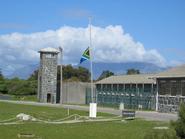
William Cowles '09 took his history major into new territory this summer when he turned to the little-studied Robben Island hunger strikes. Cowles was interested in researching South Africa and subsequently applied for and was awarded an Emerson grant to investigate and build a timeline for the evolution of the Robben Island hunger strikes as a method of political resistance.
Robben Island, a small flat island in the Cape Town Harbor, was used as a place of incarceration for nearly 400 years, beginning with Dutch malcontents in the 17th century and continuing until 1991. Between 1959 and 1991, Robben Island functioned as a notorious high-security prison for anti-apartheid political prisoners.
Cowles focused his research on the period between 1966 and 1991, the point at which the political prisoners on the island began to make extensive use of hunger strikes as a form of resistance, to protest both the prison conditions and their status (they were political prisoners rather than criminal convicts).
Because there has been very little research done on the hunger strikes themselves, Cowles' goal for the summer was to create a timeline of the evolution of the hunger strikes, and to draw a "unifying theme" among the various strikes organized in the prison within this time frame. Cowles explained, "my goal was to appreciate the evolution of hunger strikes in the minds of both the prisoners and the government through the end of apartheid." He succeeded in this goal, and will present both paper and timeline later this year.
The interest in South Africa was roused by Cowles' participation in History 278: South Africa, 1962-1998. The teacher of the course, Associate Professor of History Kevin Grant, later approached Cowles about a summer grant and Cowles chose to investigate the hunger strikes, advised by Grant. "It is a fascinating country and one that I have always been interested in," Cowles said of South Africa.
Cowles enjoyed his first summer of research, calling it "the best summer 'job' I ever had" and the research itself "exciting" and "engaging." Working in a little-researched field, Cowles admitted that he sometimes felt like a detective, "hunting down clues."
During the year, Cowles is a member of the Hamilton crew team and works at the writing center. His research this summer was funded by the Emerson Foundation Grant Program, which provides students with significant opportunities to work collaboratively with faculty mentors, researching an area of mutual interest. Recipients typically undertake some combination of fieldwork, laboratory investigation, library research and the development of teaching materials. A public presentation of their findings is required of all Emerson Scholars during the academic year.
-- by Lisbeth Redfield
Robben Island, a small flat island in the Cape Town Harbor, was used as a place of incarceration for nearly 400 years, beginning with Dutch malcontents in the 17th century and continuing until 1991. Between 1959 and 1991, Robben Island functioned as a notorious high-security prison for anti-apartheid political prisoners.
Cowles focused his research on the period between 1966 and 1991, the point at which the political prisoners on the island began to make extensive use of hunger strikes as a form of resistance, to protest both the prison conditions and their status (they were political prisoners rather than criminal convicts).
Because there has been very little research done on the hunger strikes themselves, Cowles' goal for the summer was to create a timeline of the evolution of the hunger strikes, and to draw a "unifying theme" among the various strikes organized in the prison within this time frame. Cowles explained, "my goal was to appreciate the evolution of hunger strikes in the minds of both the prisoners and the government through the end of apartheid." He succeeded in this goal, and will present both paper and timeline later this year.
The interest in South Africa was roused by Cowles' participation in History 278: South Africa, 1962-1998. The teacher of the course, Associate Professor of History Kevin Grant, later approached Cowles about a summer grant and Cowles chose to investigate the hunger strikes, advised by Grant. "It is a fascinating country and one that I have always been interested in," Cowles said of South Africa.
Cowles enjoyed his first summer of research, calling it "the best summer 'job' I ever had" and the research itself "exciting" and "engaging." Working in a little-researched field, Cowles admitted that he sometimes felt like a detective, "hunting down clues."
During the year, Cowles is a member of the Hamilton crew team and works at the writing center. His research this summer was funded by the Emerson Foundation Grant Program, which provides students with significant opportunities to work collaboratively with faculty mentors, researching an area of mutual interest. Recipients typically undertake some combination of fieldwork, laboratory investigation, library research and the development of teaching materials. A public presentation of their findings is required of all Emerson Scholars during the academic year.
-- by Lisbeth Redfield
